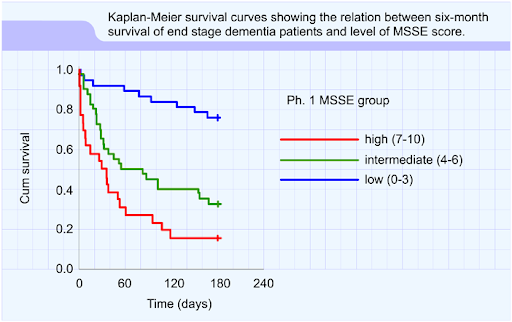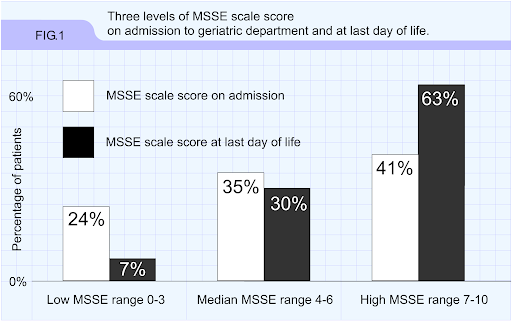Medicine:Aminoff Suffering Syndrome
This article may require copy editing for grammar, style, cohesion, tone, or spelling. (October 2021) (Learn how and when to remove this template message) |
Aminoff Suffering Syndrome diagnosed, defined, investigated in progressive medical study, presented and published by Israeli geriatric physician Dr. Bechor Zvi Aminoff. First clinical investigation of Aminoff Suffering Syndrome performed by Dr. Aminoff in Geriatric's D department of Chaim Sheba Medical Center Tel Hashomer on 1999 – 2005 years. First presentation of Aminoff Suffering Syndrome was in 10th International Conference on Alzheimer's Disease and Related Disorders in Madrid on 2006.[1][2] The Aminoff suffering syndrome is characterized by a high MSSE scale score, less than 6 months’ survival for terminal patients, less than 1-month survival for dying patients, irreversible and intractable aggravation of medical conditions, and suffering until demise.[3][4][5]
Mini Suffering State Examination
The MSSE (Table 1) scale below show is the first objective clinical tool for evaluation of suffering level in advanced dementia. The MSSE scale is available in English, Hebrew, Dutch, Germane, Italian, Spanish and Slovenia, and covers 10 items (range 0-10). A high MSSE scale score with range 7-10 indicates a high level of suffering, and reflects the severity of the medical condition in advanced dementia.[6][7]
| Date | |||||
| Not calm | |||||
| Screams | |||||
| Pain | |||||
| Decubitus ulcers | |||||
| Malnutrition | |||||
| Eating disorders | |||||
| Invasive action | |||||
| Unstable medical condition | |||||
| Suffering according to family opinion | |||||
| Suffering according to medical opinion | |||||
| Total MSSE score |
The MSSE Score Interpretation:
- Low level of suffering: range 0-3
- Intermediate level of suffering: range 4-6
- High level of suffering: range 7-10
The MSSE scale was tested using the Cronbach α model, which demonstrated its significant reliability (α = 0.798). Convergent validity of the MSSE scale was proven by Pearson correlation with Symptom Management in End-of-Life in Dementia (SM–EOLD) scale (r = 0.574, P < 0.0001), and Comfort Assessment in Dying with Dementia (CAD–EOLD) scale [26, 27] (r = -0.796, P < 0.0001). The differences between the survival times of the three MSSE scale score groups was evaluated by Kaplan-Meier analysis (Log Rank, P = 0.0018, Breslow, P = 0.0027) and were significant. The results of the Cox proportional Hazard model of survival showed a high correlation between high MSSE scale score and high risk of mortality, and short survival of end-stage dementia patients during the last 6 months of life with significant predicting validity (P = 0.013). According to the MSSE scale, it has been confirmed that patients with end-stage dementia represent a heterogeneous group and have different levels of suffering, and accordingly proved a significant concurrent validity. Aminoff Suffering Syndrome was proposed as the key criterion for enrolling end-stage disease and dying patients to a hospice, or Relief of High Suffering with Dementia Units.[8][9][10]
Less than 20% of end stage the Alzheimer's disease patients in Aminoff Suffering Syndrome had 6 month survival.[11][12][13]
At last day of life 63% of Alzheimer's disease patients were in Aminoff Suffering Syndrome.[14][15][16][17]
References
- ↑ Internationals, Ommega (2017-11-15). "Aminoff Suffering Syndrome in advanced Alzheimer's disease and end-of-life: First 10 years" (in en). Letters in Health and Biological Sciences 2 (2): 86–90. doi:10.15436/2475-6245.17.021. https://www.ommegaonline.org/article-details/Aminoff-Suffering-Syndrome-in-advanced-Alzheimers-disease-and-end-of-life-First-10-years/1626.
- ↑ Aminoff, Bechor Zvi (2016). "Not Calm and Aminoff Suffering Syndrome in Advanced Alzheimer's Disease". American Journal of Alzheimer's Disease and Other Dementias 31 (2): 169–180. doi:10.1177/1533317515598858. ISSN 1938-2731. PMID 26294697. https://pubmed.ncbi.nlm.nih.gov/26294697/.
- ↑ Peisah, Carmelle; Jessop, Tiffany (2021). "In search of the holy grail of quality dying with dementia" (in en). International Psychogeriatrics: 1–3. doi:10.1017/S1041610220003658. ISSN 1041-6102. PMID 34105447. https://www.cambridge.org/core/journals/international-psychogeriatrics/article/abs/in-search-of-the-holy-grail-of-quality-dying-with-dementia/F6A08369F1A32F04270D1CBDD0CB7D56.
- ↑ Nash, Maureen C.; Patel, Amita R.; Rose, Susan S.; Swantek, Sandra S. (2020-04-01). "The Imperative for Person-Centered Dementia Care: Focus on Assessing and Working With Long-Term Care Residents Rather Than Percentage of People on a Medication" (in English). Journal of the American Medical Directors Association 21 (4): 562–563. doi:10.1016/j.jamda.2019.10.023. ISSN 1525-8610. PMID 32113913. https://www.jamda.com/article/S1525-8610(19)30888-6/abstract.
- ↑ "Discussion on: Aminoff Suffering Syndrome: A Challenge for Medical and Nursing Staff during End-of-Life Care: Open Letter and Proposals – B P International" (in en-US). https://www.bookpi.org/media-promotion/discussion-on-aminoff-suffering-syndrome-a-challenge-for-medical-and-nursing-staff-during-end-of-life-care-open-letter-and-proposals/.
- ↑ "Table 1 . Mini Suffering State Examination (MSSE)" (in en). https://www.researchgate.net/figure/Mini-Suffering-State-Examination-MSSE_tbl1_228471325.
- ↑ Adunsky, Abraham; Aminoff, Bechor Zvi; Arad, Marina; Bercovitch, Michaela (2008-12-01). "Mini-Suffering State Examination: Suffering and Survival of End-of-Life Cancer Patients in a Hospice Setting" (in en). American Journal of Hospice and Palliative Medicine 24 (6): 493–498. doi:10.1177/1049909107307374. ISSN 1049-9091. PMID 18160543. https://doi.org/10.1177/1049909107307374.
- ↑ Aminoff, Bechor Zvi (2016). "Not Calm and Aminoff Suffering Syndrome in Advanced Alzheimer's Disease". American Journal of Alzheimer's Disease and Other Dementias 31 (2): 169–180. doi:10.1177/1533317515598858. ISSN 1938-2731. PMID 26294697. https://pubmed.ncbi.nlm.nih.gov/26294697/.
- ↑ "Mini-Suffering State Examination (MSSE) scale: first five years. | Professor Bechor Zvi Aminoff MD., PhD. Medical and Philosophy Research" (in en-US). October 5, 2021. http://www.aminoff-end-of-life-suffering-happiness.co.il/mini-suffering-state-examination-msse-scale-first-five-years/.
- ↑ Aminoff, B. Z. (2014). "Prognosis of Short Survival in Patients With Advanced Dementia as Diagnosed by Aminoff Suffering Syndrome". American Journal of Alzheimer's Disease and Other Dementias 29 (8): 673–677. doi:10.1177/1533317514539543. PMID 24939003. https://www.semanticscholar.org/paper/Prognosis-of-Short-Survival-in-Patients-With-as-by-Aminoff/5989f3d9f7f11cede35c549e4d5d9af60b07aad1.
- ↑ Aminoff, Bechor Z. (2010). "P3-436: Aminoff suffering syndrome and decubitus ulcers in advanced dementia" (in en). Alzheimer's & Dementia 6 (4S_Part_19): S581. doi:10.1016/j.jalz.2010.05.1978. ISSN 1552-5279. https://onlinelibrary.wiley.com/doi/abs/10.1016/j.jalz.2010.05.1978.
- ↑ Aminoff, Bechor Zvi; Adunsky, Abraham (2006-11-01). "Their last 6 months: suffering and survival of end-stage dementia patients". Age and Ageing 35 (6): 597–601. doi:10.1093/ageing/afl067. ISSN 0002-0729. PMID 16926196. https://doi.org/10.1093/ageing/afl067.
- ↑ Koppitz, Andrea; Bosshard, Georg; Kipfer, Stephanie; Imhof, Lorenz (2016-02-02). "Decision-making in caring for people with dementia at the end of life in nursing homes". International Journal of Palliative Nursing 22 (2): 68–75. doi:10.12968/ijpn.2016.22.2.68. ISSN 1357-6321. PMID 26926346. https://www.magonlinelibrary.com/doi/abs/10.12968/ijpn.2016.22.2.68.
- ↑ Aminoff, Bechor Zvi; Adunsky, Abraham (2006). "Their last 6 months: suffering and survival of end-stage dementia patients". Age and Ageing 35 (6): 597–601. doi:10.1093/ageing/afl067. ISSN 0002-0729. PMID 16926196. https://pubmed.ncbi.nlm.nih.gov/16926196/.
- ↑ Aminoff, Bechor Z. (2010). "P3-436: Aminoff suffering syndrome and decubitus ulcers in advanced dementia" (in en). Alzheimer's & Dementia 6 (4S_Part_19): S581. doi:10.1016/j.jalz.2010.05.1978. ISSN 1552-5279. https://onlinelibrary.wiley.com/doi/abs/10.1016/j.jalz.2010.05.1978.
- ↑ Aminoff, Bechor; Abraham, Adunsky (2004-01-01). "Dying dementia patients: Too much suffering, too little palliation". American Journal of Alzheimer Disease and Other Dementias 19 (5): 243–247. doi:10.1177/104990910502200507. PMID 16225356. https://www.researchgate.net/publication/259005084.
- ↑ Mitchell, Susan L.; Teno, Joan M.; Kiely, Dan K.; Shaffer, Michele L.; Jones, Richard N.; Prigerson, Holly G.; Volicer, Ladislav; Givens, Jane L. et al. (2009-10-15). "The Clinical Course of Advanced Dementia". The New England Journal of Medicine 361 (16): 1529–1538. doi:10.1056/NEJMoa0902234. ISSN 0028-4793. PMID 19828530.



